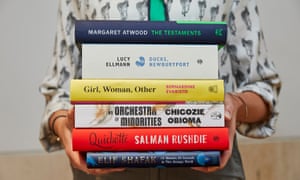The Booker prize shortlist resists easy reading
I
n an accelerated age, the best response is to take your time. There is no choice with Ducks, Newburyport, Lucy Ellmann’s 1,000-page plus novel, shortlisted on Tuesday for the 2019 Booker prize. A bewildering feat of simultaneous compression and expansion, it takes us into the mind of an Ohio housewife as her thoughts run wild – from the state of the nation to the minutiae of daily life. Its narrative occupies a mere eight sentences. Among many other things, it is a rebuke to the consistent downgrading of the “domestic” in literature, so frequently ascribed to female writers, because it insists that our consciousness does not exist in neat compartments marked personal, social, familial, political. Our heads, instead, are a riot.
What does the inclusion of Ducks, Newburyport tell us about the judges’ tastes, judgments and priorities in assembling this year’s shortlist? Perhaps foremost, that they are unafraid of issuing a challenge to readers not to make assumptions about novels based on thumbnail sketches like the one above (Ducks is a hoot, as it were, not a slog.) That they are concerned with writers concerned with foregrounding women’s voices: joining Ellmann on the list are Margaret Atwood’s The Testaments, her reprise of the world of The Handmaid’s Tale; Bernardine Evaristo’s Girl, Woman, Other, the story of 12 black British women, told in Evaristo’s trademark multi-vocal, poetic style; and Elif Shafak’s 10 Minutes 38 Seconds in This Strange World, whose title refers to the final moments of brain activity experienced by an Istanbul sex worker after a fatal assault.
Completing the half dozen are Chigozie Obioma, whose second novel, An Orchestra of Minorities, brings him his second Booker shortlisting; and Salman Rushdie’s Quichotte, which transplants the kernel of Cervantes’s Don Quixote into the world of a travelling salesman on a US road trip. In common with other novels on the shortlist (and indeed longlist: Lost Children Archive by Valeria Luiselli and John Lanchester’s The Wall spring to mind), Obioma and Rushdie’s books invoke older traditions and instances of storytelling and recast them in a contemporary world, bringing to the fore the experiences and pressures of movement and migration.
Which of these six will triumph on 14 October? (And will the ceremony have to compete with a general election?) Given the thematic unity of this year’s prize – from long- to shortlist, there has been an emphasis on experimentation and engagement with the present day – it’s not immediately obvious where divergence of opinions will begin; as ever, it’s a pin in a donkey’s tail. Perhaps out of sheer fun, my money’s on those Ducks.



No comments:
Post a Comment